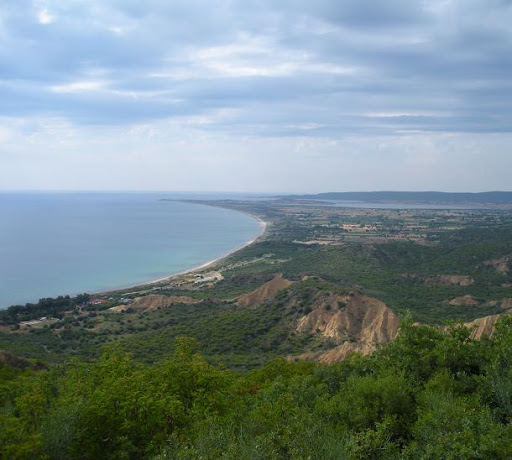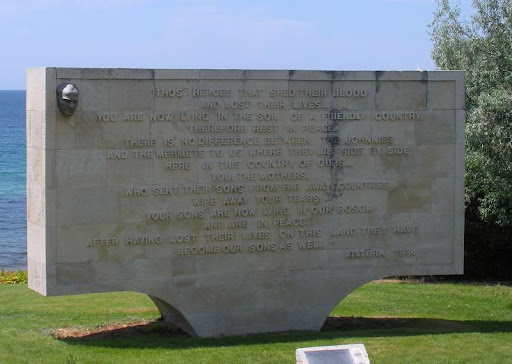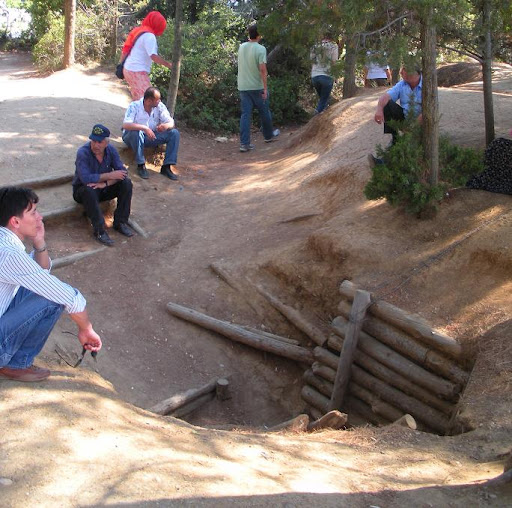We spent the day touring the peninsula in the Dardanelles where the Gallipoli Campaign was fought during World War I. Exciting!

Beginning in the nearby town of Çanakkale and continuing throughout the afternoon it was clear that the tour was tailored to a very specific crowd - Australians and New Zealanders. Our tour guide spoke English with a truly bizarre mix of Turkish and Australian accents, and all the local restaurants were decorated with stereotypical Australian widgets. My favorite may have been the Boomerang Bar and Grill, which was apparently named on the assumption that visiting Aussies would say "Hey, boomerangs! We've got those back home! You've got our business, mate!"
The astute among you will have already deduced the cause of this bias towards our cousins in the Southern Hemisphere - most of the Allied forces at Gallipoli were from the Australia and New Zealand Army Corps (ANZAC) and most of the foreign tourists coming to the battlefield are from the same countries. Our tour jumped from one ANZAC cemetery to another, highlighting the major offensives and losses of the Allies. The little attention paid to the Turks concentrated mainly on their respect for the ANZAC forces, both during and after the campaign. Ataturk's quote about the battle was featured very prominently.

"Those heroes that shed their blood and lost their lives... You are now lying in the soil of a friendly. Therefore rest in peace, there is no difference between the Johnnies and the Mehmets to us where they lay side by side, here in this country of ours... You, the mothers, who sent their sons from far away countries, wipe away your tears; Your sons are now lying in our bosom and are in peace. After having lost their lives on this land they have become our sons as well."All in all I was impressed by Turkey's ability to repackage its one victory in WWI as a foreign tourist destination.
But there's more to the story! Dr. Shields and I spoke with our tour guide about the obvious ANZAC bias in our tour, and he assured us that in recent years a very different tour has been developed for Turkish tour groups. War memorials were erected soon after the battle by the Turkish government, but were removed in the 1930s to make room for ANZAC memorials that took their place. I can only imagine how galling this must have been to Turkish nationalism. Presumably it was deemed necessary as part of the effort to integrate with the West.
In recent years the government has erected Turkish cemeteries alongside the ANZAC cemeteries. The ANZAC cemeteries, and more particularly the annual ANZAC Day, have a pretty obvious nationalist theme alongside their express purpose as a war memorial, but they've got nothing on the Turkish cemeteries. According to our tour guide, the government (and particularly AK Party) has been working to rebuild Turkish pride surrounding the Gallipoli campaign, recasting it as a nationalist religious shrine for the Turkish martyrs who fell at Gallipoli in defense of Islam. Every day, AKP foots the bill to bring busloads of conservative-minded lower class Istanbullus to Gallipoli to be reminded of the martyrs of yesteryear.
The Turkish casualties buried in the Gallipoli cemeteries are referred to as religious martyrs (which is not particular to Gallipoli, admittedly - the staunchly secular military refers to all of its casualties that way) and gazi - the Turkish word that is essentially equivalent to mujihadeen. The Turkish cemeteries include prominent mihrab, the key component that makes a mosque a mosque, reemphasizing the religious air of the sites. It seems pretty incredible for these to be funded by an ostensibly secularist state (particularly at a battlefield where Ataturk himself was the commanding officer!).
Dr. Shields commented on the danger of AKP attempting to hitch Islamism onto the nationalist machine that Turkey has perfected over the years, but didn't expand on where that danger lay. As we stood at the remains of the ANZAC trenches listening to our tour guide speak in an Australian about the conditions of the ANZAC soldiers on campaign, and a Turkish tour guide stood twenty feet away at the Ottoman trenches telling a headscarved crowd about (presumably) the conditions of the Turkish martyrs on campaign, I ticked off the potential dangers in my head.

Equating national pride with Islam and Islamism with national identity can help to rapidly expand the party's support base, but it might increase the risk of eventual conflict with a military and Kemalist elite that find such manipulation of their own manipulation of the public perception distasteful.
While most Islamist parties have in the past been virulently anti-Western, AKP has distinguished itself by pushing for both Islamism and Westernization. While encouraging Turkish nationalism may help their push for Islamism (though it's unlikely), glorifying a battle between Turkey and the West as a clash between Islam and the infidel can hardly help their attempts at Westernization.
Secular nationalism and Islamism provide diametrically opposed sources of social cohesion that allow Turkish polity to swing from one extreme to the other - it's not a particularly stable system but it works. AKP's decision to equate itself with its ideological opponent may make for good propaganda in the short run but if the ideas become too inextricably linked it could be catastrophic for both movements later on. So long as the two remain separate, there is always a viable alternate base for national cohesion. But if, as Erdoğan once claimed, democracy is a train from which one can disembark on reaching one's destination, perhaps nationalism is a bus from which one can do the same.
As we finished at the trenches and continued our survey of ANZAC cemeteries, we noticed that the bus of the faithful had broken down. It was being pushed to the next Turkish shrine by a number of men determined to continue the pilgrimage.
Maşallah.